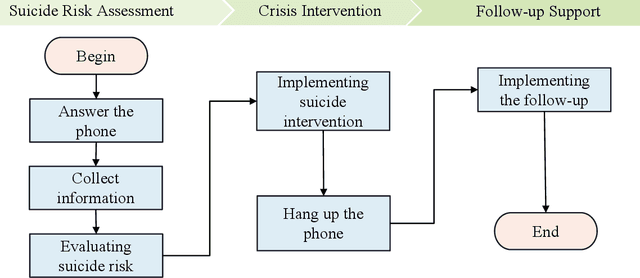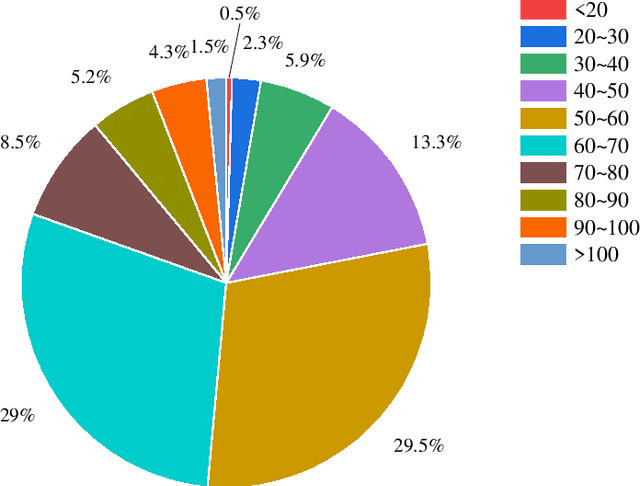Yongsheng Tong
Deep Learning-Based Feature Fusion for Emotion Analysis and Suicide Risk Differentiation in Chinese Psychological Support Hotlines
Jan 15, 2025



Abstract:Mental health is a critical global public health issue, and psychological support hotlines play a pivotal role in providing mental health assistance and identifying suicide risks at an early stage. However, the emotional expressions conveyed during these calls remain underexplored in current research. This study introduces a method that combines pitch acoustic features with deep learning-based features to analyze and understand emotions expressed during hotline interactions. Using data from China's largest psychological support hotline, our method achieved an F1-score of 79.13% for negative binary emotion classification.Additionally, the proposed approach was validated on an open dataset for multi-class emotion classification,where it demonstrated better performance compared to the state-of-the-art methods. To explore its clinical relevance, we applied the model to analysis the frequency of negative emotions and the rate of emotional change in the conversation, comparing 46 subjects with suicidal behavior to those without. While the suicidal group exhibited more frequent emotional changes than the non-suicidal group, the difference was not statistically significant.Importantly, our findings suggest that emotional fluctuation intensity and frequency could serve as novel features for psychological assessment scales and suicide risk prediction.The proposed method provides valuable insights into emotional dynamics and has the potential to advance early intervention and improve suicide prevention strategies through integration with clinical tools and assessments The source code is publicly available at https://github.com/Sco-field/Speechemotionrecognition/tree/main.
Deep Learning and Large Language Models for Audio and Text Analysis in Predicting Suicidal Acts in Chinese Psychological Support Hotlines
Sep 10, 2024



Abstract:Suicide is a pressing global issue, demanding urgent and effective preventive interventions. Among the various strategies in place, psychological support hotlines had proved as a potent intervention method. Approximately two million people in China attempt suicide annually, with many individuals making multiple attempts. Prompt identification and intervention for high-risk individuals are crucial to preventing tragedies. With the rapid advancement of artificial intelligence (AI), especially the development of large-scale language models (LLMs), new technological tools have been introduced to the field of mental health. This study included 1284 subjects, and was designed to validate whether deep learning models and LLMs, using audio and transcribed text from support hotlines, can effectively predict suicide risk. We proposed a simple LLM-based pipeline that first summarizes transcribed text from approximately one hour of speech to extract key features, and then predict suicidial bahaviours in the future. We compared our LLM-based method with the traditional manual scale approach in a clinical setting and with five advanced deep learning models. Surprisingly, the proposed simple LLM pipeline achieved strong performance on a test set of 46 subjects, with an F1 score of 76\% when combined with manual scale rating. This is 7\% higher than the best speech-based deep learning models and represents a 27.82\% point improvement in F1 score compared to using the manual scale apporach alone. Our study explores new applications of LLMs and demonstrates their potential for future use in suicide prevention efforts.
An Exploratory Deep Learning Approach for Predicting Subsequent Suicidal Acts in Chinese Psychological Support Hotlines
Aug 29, 2024



Abstract:Psychological support hotlines are an effective suicide prevention measure that typically relies on professionals using suicide risk assessment scales to predict individual risk scores. However, the accuracy of scale-based predictive methods for suicide risk assessment can vary widely depending on the expertise of the operator. This limitation underscores the need for more reliable methods, prompting this research's innovative exploration of the use of artificial intelligence to improve the accuracy and efficiency of suicide risk prediction within the context of psychological support hotlines. The study included data from 1,549 subjects from 2015-2017 in China who contacted a psychological support hotline. Each participant was followed for 12 months to identify instances of suicidal behavior. We proposed a novel multi-task learning method that uses the large-scale pre-trained model Whisper for feature extraction and fits psychological scales while predicting the risk of suicide. The proposed method yields a 2.4\% points improvement in F1-score compared to the traditional manual approach based on the psychological scales. Our model demonstrated superior performance compared to the other eight popular models. To our knowledge, this study is the first to apply deep learning to long-term speech data to predict suicide risk in China, indicating grate potential for clinical applications. The source code is publicly available at: \url{https://github.com/songchangwei/Suicide-Risk-Prediction}.
Fine-grained Speech Sentiment Analysis in Chinese Psychological Support Hotlines Based on Large-scale Pre-trained Model
May 07, 2024



Abstract:Suicide and suicidal behaviors remain significant challenges for public policy and healthcare. In response, psychological support hotlines have been established worldwide to provide immediate help to individuals in mental crises. The effectiveness of these hotlines largely depends on accurately identifying callers' emotional states, particularly underlying negative emotions indicative of increased suicide risk. However, the high demand for psychological interventions often results in a shortage of professional operators, highlighting the need for an effective speech emotion recognition model. This model would automatically detect and analyze callers' emotions, facilitating integration into hotline services. Additionally, it would enable large-scale data analysis of psychological support hotline interactions to explore psychological phenomena and behaviors across populations. Our study utilizes data from the Beijing psychological support hotline, the largest suicide hotline in China. We analyzed speech data from 105 callers containing 20,630 segments and categorized them into 11 types of negative emotions. We developed a negative emotion recognition model and a fine-grained multi-label classification model using a large-scale pre-trained model. Our experiments indicate that the negative emotion recognition model achieves a maximum F1-score of 76.96%. However, it shows limited efficacy in the fine-grained multi-label classification task, with the best model achieving only a 41.74% weighted F1-score. We conducted an error analysis for this task, discussed potential future improvements, and considered the clinical application possibilities of our study. All the codes are public available.
 Add to Chrome
Add to Chrome Add to Firefox
Add to Firefox Add to Edge
Add to Edge